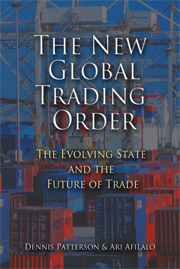Book contents
- Frontmatter
- Contents
- Preface
- 1 Introduction
- 2 The Evolving State
- 3 The Changing Nature of Welfare
- 4 Disaster and Redemption: 1930s and Bretton Woods
- 5 The Transformation of the Bretton Woods World and the Rise of a New Economic Order
- 6 The End of Bretton Woods and the Beginning of a New Global Trading Order
- 7 The Enablement of Global Economic Opportunity
- 8 Trade and Security
- Conclusion
- Notes
- Bibliography
- Index
6 - The End of Bretton Woods and the Beginning of a New Global Trading Order
Published online by Cambridge University Press: 02 July 2009
- Frontmatter
- Contents
- Preface
- 1 Introduction
- 2 The Evolving State
- 3 The Changing Nature of Welfare
- 4 Disaster and Redemption: 1930s and Bretton Woods
- 5 The Transformation of the Bretton Woods World and the Rise of a New Economic Order
- 6 The End of Bretton Woods and the Beginning of a New Global Trading Order
- 7 The Enablement of Global Economic Opportunity
- 8 Trade and Security
- Conclusion
- Notes
- Bibliography
- Index
Summary
Thesis:
Statecraft evolves through successive stages, each characterized by foundational norms that shape the constitutional structure of states and of the international system in which they participate. The norms drive the design of the institutions that are best suited for states sharing hallmarks of a given Statecraft era, and the victors of epochal wars have the opportunity to shape institutions that best suit their form of Statecraft. A new trading and welfare norm is emerging in the era of post-modern Statecraft: the enablement of global economic opportunity. This era of Statecraft requires new institutions to govern trade in a diffuse and globalized world.
Our claim is that today's trade partners must devise new international economic institutions, operating in accordance with a novel animating norm. This transformation of the constitutional structure of international trade, we believe, is necessary because Statecraft has entered a new epochal iteration. Over hundreds of years, trade has married itself to both law and strategy in each successive evolution of the State. Today, as it did at Bretton Woods, the world needs a constitutional moment that will generate new institutions and actuate a new norm. This is what must be done in order to give global commercial actors the best chance of meeting the challenges of the post-modern world. In this chapter we describe the trade institutions of the post-modern age, drawing analytical inspiration from the institutional history of the prior eras of Statecraft.
- Type
- Chapter
- Information
- The New Global Trading OrderThe Evolving State and the Future of Trade, pp. 110 - 146Publisher: Cambridge University PressPrint publication year: 2008
- 1
- Cited by



